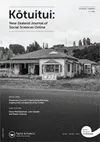Gender Attitudes Survey 2025 released
8
October
2025


The 2025 Gender Attitudes Survey, led by Te Kaunihera Wāhine o Aotearoa | The National Council of Women of NZ, has been released. This is the fifth survey measuring attitudes around gender in Aotearoa and is conducted with Rangahau Aotearoa | Research NZ. It follows on from surveys in 2017, 2019, 2021, and 2023.
The 2025 Gender Attitudes Survey report can be found here.
The survey explores three key questions from the perspective of the general public of Aotearoa New Zealand and monitors how attitudes and beliefs change over time:
- What importance do New Zealanders place on gender equality?
- How is this reflected in their opinions about the genders?
- How well are we doing in terms of achieving gender equality?
The survey achieved a sample of 1,250 respondents aged 18 and over and was selected to be representative of all New Zealanders in terms of gender, age, ethnicity, and geographic location.
Results from the 2025 survey are also available through a reporting ‘e-tool’, which allows users to sort the survey results by other variables including ethnicity, age, region and household status.
The e-tool can be found here along with instructions on how to use it. The username for the e-tool is Gender and the password is Equality.
Key insights
Key findings in the survey report are grouped into four sections.
- Gender equality in Aotearoa New Zealand – the status quo.
- Current opinion about gender, sexual diversity and the teaching of these subjects in schools.
- Progress in achieving gender equality in Aotearoa New Zealand.
- Specific issues relating to gender equality and inequality.
Gender equality and gender-based violence
A significant minority of respondents believe that we no longer need to work towards gender equality:
- 21% do not believe gender equality is a fundamental right
- 46% of New Zealanders think that gender equality has already been achieved for the most part
- 40% don’t believe that sexism is still a significant issue
- 21% of respondents believe gender equality has gone too far
These results are underscored by concerning attitudes towards violence and violence against women.
Men were more likely than women to agree with two statements about gender-based violence e.g., 37% of men agreed that a man who doesn’t fight back when he’s pushed around will lose respect as a man compared with 20% of women.
Over time, agreement with “hitting out is an understandable response for a man when his wife or girlfriend tries to end a relationship” has increased from 8% in 2017 to 14% in 2025.
Sexual Wellbeing Aotearoa chief executive Jackie Edmond said in a press release that the survey results showed Aotearoa was backsliding on opinions related to gender, equality, sexual violence, and sexual and reproductive health:
“Just this week, we’ve had a former politician make some startling comments about women – reducing them simply to body parts. Comments of this kind embolden others. Our leaders – in politics, in culture, in all aspects of society – need to step up, condemn this kind of rhetoric, take the lead and say these attitudes have no place in Aotearoa New Zealand in 2025.”
Similar results are being observed in other countries including Australia. For example, data released in April 2025 by Our Watch demonstrated that work was still needed to overcome myths about gender discrimination, showing that twice as many men employees (54%) than women employees (25%) believe women have the same opportunities in Australia today.
Rape myths
Men were more likely to agree with common rape myths than women e.g., 40% of men agreed that false rape accusations are common compared with 27% of women.
Over time, agreement with “rape happens when a man’s sex drive is out of control” has increased from 25% in 2017 to 36% in 2025.
Suzanne Manning, president of the NCWNZ, told The Press [paywalled] that the statistics about rape attitudes were particularly concerning. In NCWNZ’s press release, she said a mistaken belief that gender equality had already been achieved revealed worrying complacency:
“Our survey is telling us that having equality for all genders is important to us, but some attitudes Kiwis have are holding us back – and pushback from smaller groups is reversing our forward progress in some key areas… If we believe gender equality has been achieved, we’re unlikely to prioritise actions that must be sustained to make true progress.”
A key research report from ANROWS in 2021 examines the persistence of rape myths Australia. It found that as many as four in ten Australians have mistrust of women's reports of sexual violence.
The right to choose
Men were less likely than women to agree that a woman should have the right to choose whether or not she has an abortion (70% compared to 78% for women).
Overall agreement has significantly decreased from 78% in 2023 to 73% in 2025.
For further reading, see journal article: ‘I had no control over my body’: women’s experiences of reproductive coercion in Aotearoa New Zealand.
Young men
In general, men were more optimistic than women about gender equality having been achieved. There were significant differences by age, with younger men most likely to agree with negative statements and the least likely to agree with positive statements about gender equality.
33% of young men (aged 18-34) agreed that gender equality has gone too far in Aotearoa New Zealand compared with 15% for young women. Young men were also less likely to agree that gender equality is a fundamental right (67% compared with 78% young women), and less likely to agree that sexism is still a significant issue in Aotearoa (55% compared with 64% for young women).
This divide is reflected in international research carried out by Ipsos UK and King's College London in the 2025 International Women's Day Survey. It found that Gen Z men were more likely than Gen Z women to agree men are being expected to do too much to support equality, to say we have gone so far in promoting women's equality that we are discriminating against men, and to say a man who stays home to look after his children is less of a man. In a King's College London press release, Kelly Beaver, Chief Executive of Ipsos, said:
“Particularly when considered against the backdrop of recent elections in the US and Germany, where young men were significantly more likely than young women to back right-wing political parties, our data underscores the urgent need for nuanced conversations and inclusive solutions that address the concerns of all genders. We must find ways to bridge this divide and ensure that progress towards gender equality benefits everyone, without leaving anyone behind.”
Michael Flood's 2024 report, Effective practice in violence prevention education with boys and young men, further examines violence prevention education with boys and young men including the prevalence of violence-supportive attitudes and norms among young people online and offline.
Rainbow people
Men were less likely than women to feel comfortable around gay, lesbian, bisexual, non-binary, and trans people. For example, only 77% of men were comfortable with having a bisexual manager compared to 85% of women.
Overall, respondents expressed the lowest levels of comfort around trans men and trans women compared to gay, lesbian, bisexual, and non-binary people e.g., 80% of respondents were comfortable having a bisexual person as their friend, compared to 69% with a trans man.
Since the first Gender Attitudes Survey in 2017, there has been a general downward trend in comfort levels around Rainbow people across a range of indicators. For example, only 52% of respondents in 2025 said they were comfortable playing sports with trans women, compared to 67% of respondents in 2017.
These survey results reflect a wider rollback of rights and recognition of Rainbow people, particularly trans people, worldwide.
From February 2025, the US government began removing references to transgender people from national surveys that gathered key violence statistics including the national Crime Victimisation Survey, the Survey on Sexual Victimisation and the Survey of Inmates in Local Jails.
In April 2025, the UK Supreme Court ruled that the legal definition of a woman under the 2010 Equality Act was someone born biologically female, excluding transgender women from protection against sex discrimination.
In New Zealand, the government directed Sports NZ to withdraw guidelines for the inclusion of transgender people in community sport in July 2025.
Minister of Statistics Shane Reti has also recently announced the national census would be scrapped in favour of administrative data. This came shortly after Aotearoa's 2023 census, which was the first to collect data on gender identity and sexual orientation. As reported by RNZ, there is currently no alternative source of administrative data that includes adequate data on Rainbow demographic markers.
In August 2025, Te Aka Matua o te Ture pūrongo | the Law Commission released Ia Tangata. This report examines how the Human Rights Act 1993 protects people who are transgender, non-binary, or who have innate variations of sex characteristics. It makes 27 recommendations to the government on how the Act should be reformed.
In particular, the report highlights the need to amend section 21:
“The central recommendation we make in this review is that section 21 of the Human Rights Act should be amended to clarify that the Act covers discrimination that is due to a person being transgender or non-binary or having an innate variation of sex characteristics. We recommend there should be two new prohibited grounds of discrimination: (a) ‘gender identity or its equivalents in the cultures of the person’; 2 and (b) ‘having an innate variation of sex characteristics’.”
See Vine's 2024 news story calling for submissions during the Ia Tangata review.









